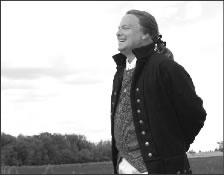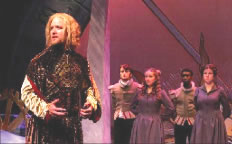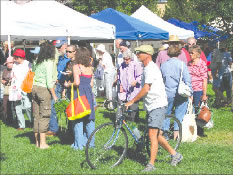ANSWERS TO THE QUESTIONS PUT TO THOMAS JEFFERSON BY THE CITIZENS OF THE COMMONWEALTH OF COLORADO.
Colorado Central: Mr. President, you have been quoted as saying, “I believe that banking institutions are more dangerous to our liberties than standing armies.”
Could you expand on this and do you believe this to be true in your observations of the 21st century?

President Jefferson: All wealth comes from the soil. Farmers (and miners) produce wealth. Others merely manipulate that wealth. Bankers and stock speculators do no real work. They merely abstract what should be a natural economy into a metaphysical one. They say they do this to make the economy more efficient. In fact they are usually trying to cheat those who do the real work of our civilization. I fear banks, and I fear a nation that turns to banks. And by the way, if we must have money, then let it be stamped on precious metals. They have value anywhere on earth. Paper money is only worth the value ascribed to it. That opens the door to currency speculation and corruption.
Colorado Central: Your disdain for newspapers can be found in any number of your quotes, such as:
“The man who reads nothing at all is better educated than the man who reads nothing but newspapers.”
Yet, you also have been quoted as saying, “Were it left to me to decide whether we should have a government without newspapers, or newspapers without a government, I should not hesitate a moment to prefer the latter.”
Could you explain the apparent discrepancy?
President Jefferson: Of course we need a free press in a free society, but that does not mean that it will necessarily serve the function expected of it. I was the victim of scurrilous newspaper attacks all of my life. They were usually written by people who had never met me. During the course of the great war for the meaning of the American Revolution (1780-1800), I was vilified not because I deserved it but because it was expedient to vilify me by those who wanted to turn the United States into an aristocracy or monarchy.
By the time I left the Presidency in 1809, I was thoroughly disgusted with the press. I wrote negatively of its failure to serve the real interests of the American people. But that does not mean we should censor it or dispose of it.
It is absolutely essential in a free society to have a free press—to disseminate information to our citizens. Without an informed citizenry we cannot govern ourselves. A free press also holds the government accountable. It smells out corruption, abuse, inefficiency, foreign adventurism.
The price of freedom is realizing that the people (or some of them) may not always use their freedom responsibly. That troubles me deeply, but it does not alter my view that we cannot be a republic unless we have a free press.
Colorado Central: Could you define “a well-organized and armed militia?”
President Jefferson: Easily. We should have little or no standing army and no permanent Navy, if possible. History shows that standing armies are always a threat to the rights of man and the permanence of a republic. When you create a professional military class, and feed it with tax dollars, it will seek wars to fight and serve as a constant temptation to fight rather than negotiate or tolerate differences.
We need a very highly trained people’s militia (minutemen who meet on the village square to drill). These will be farmers, merchants, and tradesmen who would rather be pursuing happiness at home. If we are attacked, they will serve as the first line of defense.
We sometimes may need a professional army or navy, but they should be kept in abeyance until actual invasion.
If the people organize themselves for their common defense, two things are certain. First, they will almost never decide to engage in wars. The people are private and peaceful. They will choose to fight only when their very survival is at stake. All else they will negotiate. Second, they will never engage in offensive wars. They will never go on foreign adventures. A militia is defensive only.
And by the way, in order to insure that well-regulated militia, we must guarantee each citizen the right to his own weaponry. If a citizen army gets its guns from the state, it is no longer a people’s militia.
Colorado Central: What do you make of the new “sustainability” movement in America, as demonstrated by Michelle Obama’s vegetable garden at the White House?
President Jefferson: One woman’s vegetable garden is not a significant event in sustainability.
Beware of aggrandizing the first family as if they were kings or aristocrats. They are people like other people.
I did the vegetable and grocery shopping for the White House during my time as President. But I would not have wanted the country analyzing that.
Sustainability makes perfect sense. I wrote to Madison that the world belongs in usufruct to the living. By that I meant that the generation using the earth has a right to its fruits, but it must never degrade the fruitfulness of the earth. In fact, if we can we must try to make it more rather than less fruitful with our husbandry.
My son in law Thomas Mann Randolph and I pioneered contour plowing and plant rotation in Albemarle County.
I believe that stewardship is a better term than sustainability, but I take your point.
Colorado Central: Your own ideals of government appear to have been highly influenced by an image of America as a nation of farmers. Did you see live to see any of the effects of the burgeoning industrial revolution? If so, what were they and what did you think of them?
President Jefferson: Farmers are the chosen people of God. As long as we are a national of farmers we will be the most enlightened, virtuous, and happy people in history. The moment we begin to crowd into cities, which are so many cancer sores on the face of the landscape, farewell happiness and farewell liberty.
In my time 97% of the American people were farmers. In your time, less than 3% are farmers.
It does not seem to me that you can really be a republic under such circumstances, unless you educate yourselves more thoroughly than any people who ever lived on earth.
I saw the very beginnings of the industrial revolution. In England in 1786 I saw a steam engine created by James Watt and operated by coal. I realized that steam would be a very important source of power. One of my granddaughters actually had a steamboat ride on the James River after my retirement from the Presidency. I was aware of New England mills run by water wheels. I built a nail factory at Monticello, though the equipment was very primitive. I believe in applying human ingenuity to the amelioration of the condition of mankind, but I would be very sorry to see us move away from an agrarian way of life toward an urban-industrial one. Still, all nations change. Societies are dynamic not static. The great questions of economic justice and the rights of man are constant. The way we get from Boston to New York may change, and the way we grind our wheat, but the fundamental questions of culture are a constant. As long as we remain a republic, we can probably absorb changes in technique.
Colorado Central: Do you believe we currently have “too much government” in the U.S.?
President Jefferson: Of course. By many magnitudes. That government is best that governs least, and that government is best that is most local.
You have become accustomed to so much government, especially at the national level, that you are edging into Thomas Hobbes’ Leviathon.
When government engages in forestry and agriculture, health and labor practices, the arts and humanities, you are living in a benign despotism.
I suggested to my friend James Madison that we tear up the constitution of the United States once every 19 years so that the living generation could legislate on behalf of their own happiness rather than merely inherit constitutions, laws, and public debt from their ancestors. Periodic (but frequent) constitutional revisal would allow you to rid yourself of the mountains of unnecessary laws that now tyrannize you.
Colorado Central: Abigail Adams’s exhortation to her husband John regarding women’s right to suffrage – “Remember the ladies” – was remarkable both in the eloquence of its expression, and its author’s apparent conviction that her audience would hear and heed it. Was John Adams, or any of the Founding Fathers, in fact, sympathetic to women’s suffrage, or was that an obscure idea in your time?
President Jefferson: Abigail Adams was an extraordinary woman, but I would not have wanted to be married to her. Women’s place is in the home, in fact in the nursery. Women’s “rights” are protected by the primary men in their lives: their fathers, their brothers, and then their husbands, eventually their sons. The tender breasts of women were not formed for political convulsion. Mrs. Adams surely was jesting.
Women have suffrage. Their “votes” are cast by their husbands. Why would any family want two votes?
Women’s suffrage is not an obscure idea. It is a bad idea.
Colorado Central: What, in your opinion, has been the greatest difference universal suffrage has made to the American political scene?
President Jefferson: I was the first American to call for universal white manhood suffrage without a property requirement. The wider we stretch the franchise (suffrage) the more truly republican we are as a people. In the Old World, only the rich and the well born counted. Here we are moving towards all white men. Perhaps future ages will move farther. The more you diffuse power and money and sovereignty across a wide space of territory and demographics, the more responsibly power will be used.
Colorado Central: Would you condone torture if the lives of American citizens were at stake?
President Jefferson: Never. America is the world’s Enlightenment nation. We have to set the standards of a civilized world and then we have to live according to those standards to show that it can be done. I wrote a letter to Patrick Henry, the Governor of Virginia, during the darkest days of the Revolutionary War, urging him to declare to the world that we would treat prisoners humanely, exempt certain classes of our people (farmers, chiefly) from war service, exchange prisoners in a sensible way, etc. I said it is in the interest of civilized peoples to do everything in their power to lesson the havoc of war. Never.
Colorado Central: You were no stranger to controversy and a clashing of political visions and ideals in your own Presidency. From that perspective, what do you make of the last eight or nine years of Federal government?
President Jefferson: From the point of view of anyone who cares about the civil liberties clauses of the Constitution of the United States, the last eight years have been a fundamental violation of the provisions that were forged by the founders for the protection of the people of the United States and by extension mankind. Torture, enhanced interrogation techniques, prison camps on foreign shores, surveillance of our own citizens, the bullying of dissent—all of these are signs not of a republic but a monarchy or despotism.
Still, the American people elected that administration not once but twice. They could have checked it at any time by way of pressure on their elected representatives or impeachment. The fact that the American people acquiesced in such anti-republican practices suggests that they have lost their commitment to the principles of the Founders.
Colorado Central: In your day, the literacy rate was quite low compared to nowadays, and yet more people and more people each year are considered “functionally illiterate.” In your opinion, what is the basis for a well-rounded education for our times?
President Jefferson: Literacy was actually quite high in late colonial America and the early national period. The Founding Fathers were perhaps the best read generation of leaders in American history. We all had read the classics (some, like George Washington, in translation) and we had all read deeply and widely in the books of the Enlightenment. We shaped our characters through Plutarch, Livy, and Tacitus. Our self-conscious bookishness enabled us to know what was at stake in our revolution and its aftermath, to know how the ancient Greeks and Romans had organized their civilizations, and to see how the English people had struggled over centuries to create a nation of laws and not mere force.
We need universal public education to produce a literate population, a numerate population, and one that has critical thinking skills.
I said if you expect to be a nation ignorant and free, you expect what never has been and never can be in a republic. A well-educated citizenry can govern itself or at least watch carefully those who do it on their behalf. A self-indulgent, ignorant, lazy, and easily distracted population is ripe for enslavement.
Colorado Central: Would you agree with critics of the current public school system in the US who claim reform is needed, and if so, what reforms would you like to see?
President Jefferson: For starters, you need to abandon sloganeering and return to serious education. It’s not “no child left behind,” but “every child to his capacity.” You should make sure every child understands civics: the Declaration of Independence, the Constitution, the Bill of Rights, the Magna Charta, etc. Every child should know how laws are made, how taxes are extracted from the people, how power works in the United States. Every child should be extremely well grounded in world geography. Every child should know several languages. Every child should be able to write with grammar and clarity.
Colorado Central: Speaking of public institutions, what do you think of the American public library system?
President Jefferson: It’s an amazing achievement. A well informed citizenry is essential to good government and happiness. In my time libraries were mostly private collections used by a handful of self-selected gentlemen. Benjamin Franklin helped to create circulating public libraries but they were not widespread in the United States in my time.
I spent a fortune I did not have to produce one of the largest private libraries in the United States in my time. Books were extremely expensive in my day. I was twice fortunate: I was a man of means and I had a strong idea of what a good library must contain. Most people then and now need the advice of library professionals.
It could be argued that the public library is the most Jeffersonian thing in America.
Colorado Central: Thank you, Mr. President.
Clay Jenkinson recently appeared on the Colbert Report with two other Jefferson pretenders and was named America’s Top Jefferson. Go to www.jeffersonhour.org for more details and to see the segment. Clay’s latest book is Theodore Roosevelt in Dakota Territory: An Historical Guide. And don’t miss Becoming Jefferson’s People: Re-Inventing the American Republic in the Twenty-First Century, Clay’s call for national renewal along Jeffersonian lines.


